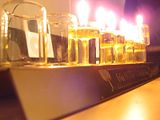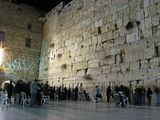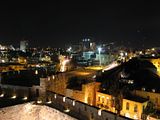Snow in Jerusalem demands a blog update...
...Since Mom's pestering last week didn't seem motivation enough.
I think I got burned out on writing for awhile; early this month, I had a D'var Torah, a "Take 5" (a lunchtime talk by one of the students), and my Educator's Program essay all to write, and with the grind of school taking it's toll, at times, I had very little motivation for blogging. I'll do my best to be better.
First off...
SNOW IN JERUSALEM.
The threat of snow was first heard Tuesday at lunch. David Bernstein, Dean of Pardes, made an announcement during lunchtime, saying, "Be aware, there is a forecast for snow tomorrow night. Don't get too excited, these are usually false alarms."
Now, growing up in Atlanta, which seems to have a relatively similar weather pattern to Jerusalem, I didn't put too much stock in a pending snowstorm; too many times had I had visions of a warm-bed-sleep-in in my mind throughout elementary and middle schools, only to wake up to dry ground and a screaming parent. These threats rarely even materialized into any precipitation at all, and they certainly often failed to develop into a snowfall that would amount to anything.
Tuesday afternoon, though, the rain started. It started out pretty light, but by Tuesday night, it was going at a good clip. I can attest that it was coming down pretty hard - we played a game of flag football out in the chilly rain (and narrowly lost, 14-7, in an epic defensive battle). It was a winter rain... cold and wet, but it was nowhere near cold enough to warrant snow, and the thought of pending flaky fun never crossed my mind.
Somewhere in the snow family, though, is a distant cousin - hail. About two minutes into my already-rainy walk to school on Wednesday morning, snow's friend decided to pay a visit. A pea-sized, hail-everywhere visit. Hail in my face, on my body, on my feet. And the wind didn't help; the little hailettes went wherever they damned well pleased, and there wasn't much I could do but get a faceful of pain, hard and wet. Now, hail looks pretty harmless when it bounces off the pavement, looks like it's made of water, but at least looks pretty frozen. I'm not sure how, then, I ended up more wet (where my parka didn't cover) from the hail than I ever have been from rain; my jeans were so soaked that they ended up soaking my socks underneath, which ended up soaking down inside my shoes, making my otherwise waterproof boots entirely useless.
After making it to Pardes, it just continued to rain. The threat of snow was still pending, as they had seen some up north, but it was just too warm and wet for any falling snow to do much but melt into the already-gigantic puddles. Thus, when the first snow flakes were reported during my afternoon Midrash class with Baruch, I didn't even make it to the window. I had seen this happen too many times growing up, too many times. Hopes raised, only to be shattered by too-warm ground or too-short a snowfall. But the snow continued to fall, and got thicker, too.
Only after dinner, though, did the hope really shine. A night seder student came in, shouting, "It's sticking!" No, it couldn't be. Yes, it was! How could this happen? So much water everywhere, still above-freezing temperatures, but sure enough, the streets were turning white and the trees were getting weighed down with this sticky-wet frozen wonderstuff. I left Pardes, though, and the snow had stopped; ah, an eighth of an inch on the ground, and that was it, then. Time for it to melt, to get back to puddly Jerusalem. Alas, no! Halfway home, the snow started again, and how! And how!
It snowed and snowed and snowed. This wasn't the light, fluffy snow that the colder cities see most of the winter... this was stick-to-your-ribs, soak-up-a-soup, thicker-n-gravy snow, a wet and heavy snowball-makin' snow, dripping wet before it hit the tree branches and street corners. A snow that didn't crunch under your feet, but rather, bit back. And it was glorious.
After a day of much-needed rain, I was over the wet stuff; I knew that Israel needs all the precipitation it could get, but half my clothes were already soaking wet, and I was losing outfits by the day. But now, precipitation we could all enjoy - water for the land, and a white wonder for the senses. It even smelled of snow... this usually-smelly city had been cleansed, covered in a peaceful blanket of sticky snow.
I went to bed with the talk of school closings. "If the public schools close, the we close. If the public schools are open, then we're open," David Bernstein also added on Tuesday. I didn't want to miss school, even though Thursdays are only half-days anyhow, but there was something about the magic of snow being so great that school closes. It creates a one-day holiday, of sorts: kids in the snow, parents home watching them, everything closed and the masses at ease.
Alas, I woke up, half the snow already melted, and the schools open for business. It got pretty close to freezing, but as I should have guessed, the puddles and running water did their trick, and the constant city traffic kept the streets from ever becoming too dangerous. I was fooled again - against my better judgement, I fell into the lull of snow-thinking, the foggy mist of snowy dreams not only fogging up my glasses, but also clouding my reasoning and understanding of the likelihoods of these weather patterns. I was built up, only to be let down.
In reality, though, I went to bed knowing that school was going to be open today, that a lot of the snow would be gone, and that, just like in my childhood, these warmer areas just don't cling to snowfalls the way colder climates do. I really chose to give in to the childish dreams of snow-filled days and empty classrooms, because I remembered the joy that always came with that excitement and anticipation, even if it ended up with me drudging to school, cursing the school board and local government. I made the choice, the attitude adjustment to believe, to hope for this little, meaningless thing.
I've thought a lot about faith, belief in G-d or a higher power, adherence to an organized religious system in the faith of questionable supporting evidence. I question those who even say "we need something to believe in;" I think there are plenty who get by just fine without believing in very much at all. Sometimes I worry that I'm investing my faith in a system that is factually problematic and religiously a little crazy. In the end, though, I'm making a choice to believe, a choice in something that may prove meaningless in a scientific sense, but in a personal sense, creates the framework for how I encounter the world. It's through this choice, this belief, that I fall asleep hoping every night, despite the potential for disappointment.
Oh and here's some snow:
PART TWO SOME RANDOM STUFF
My roommate's Chanukiyah:

The Kotel, on a Wednesday night:

Downtown Jerusalem, as seen from the Tower of David:

And here is my "Take Five" talk, if you're interested. I was asked to talk about "My Jewish Hero."
-------------------------------------------------------
The word “hero” comes from the Greek “heros,” meaning “warrior,” but I find an interesting idea of the hero stemming from Carl Jung’s system of archetypes. While this system has been used to identify stereotypes or epitomes, in a strict linguistic sense, an archetype is merely a defining example of a personality type. The hero archetype is entirely the hero – untainted by misgivings, shortcomings, and bad decisions.
I don’t know how to identify with this archetype. An archetypal hero is nothing more than a work of fantasy, an all too pure version of a human being whose existence is contradictory to the human experience. Even our culture’s archetypal “heros” fail to meet the criteria of perfection – Avraham neglects his parental obligation with Ishmael, Ya’akov tricks his brother to earn his birthright, and Moshe’s first act in Torah is that of murder. To live in this world is to betray the archetype, and to sin is unlike the archetypal hero.
In fiction, though, archetypal characters are used so that a reader might subconsciously recognize the archetype, and thus the motivations, behind the character’s behavior. Archetypes serve not as complete wholes, but rather, a set of attributes connected with otherwise flawed characters. Homer’s Odysseus is certainly not without his flaws, but his driving motivations are simple and clear – nobility, honor, and love. We learn these characteristics not out of the great duration of The Odyssey when Odysseus engages in less-than-noble behavior, but rather in the brief moments when the true motivations of his character shine through.
In this sense, heroes can only exist in fleeting moments. Our heroes stand as such for us not because of the life they are going to live, as in some fated Greek tragedy, but rather for the life that they have lived. Just as we remember our favorite musicians for the hits that we sing to ourselves every day, we also forgive them for the slew of mediocre melodies that served as little more than filler on what might have otherwise been a killer album. So too do we remember our heroes; they need only fit the archetype in a moment to stand in long-lasting relevance and meaning.
So here we come to the question I started with – who is my Jewish hero? In short, I don’t know. I see the classic Jewish heroes of both the distant and more recent past as inspirational, but I fail to connect to their memories and tales viscerally. Personally, I find so many people in my life an inspiration, but I hesitate to hold any of them up to such a high stature. I truly want my heroes to be without fault, to be so steadfast so as to hold up to perfect criticism. In a huge scope, this is an impossibility. Only when I shrink my scope, then, does the image of the hero come into focus.
I find heroes every day, especially here. In Scott Kaplan’s moving speech about his conversion, I found overwhelming and inspirational courage. In Jess Kendler’s D’var Torah, I was amazed at her outstanding ability to examine text. And in hearing so many peoples’ stories in coming to Pardes, in making a choice to spend so much time doing something so uniquely distinctive, I’m filled with awe.
If heroism lives in these moments, then we should strive for this momentary heroism. When we aim to live our life as a whole in a heroic manner, we’re bound to face disappointment. Only when we realize that steeping our deeds right now in heroism, that refocusing every moment on the acts and deeds of a hero, only then can we live on as heroes to someone.
------------------------------------------------------------
Thanks for reading, sorry for the delay. Much love, as always.
David


0 Comments:
Post a Comment
<< Home